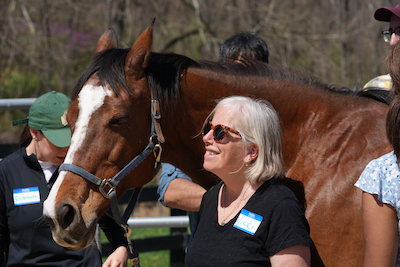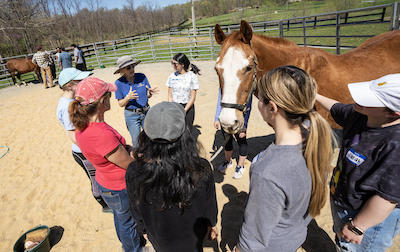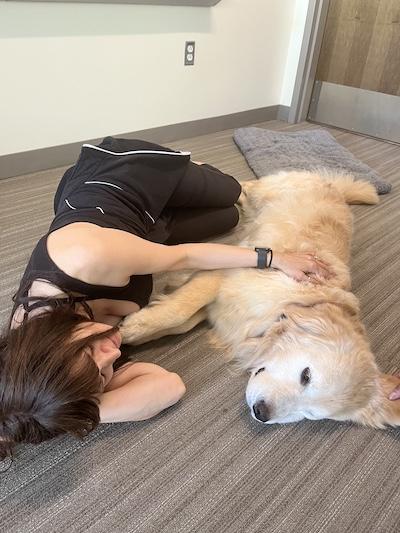Each semester Kirsch takes students in her advanced Trauma and Recovery course to Project Horse Empowerment Center in Purcellville, Virginia, to learn about the emerging field of equine assisted psychotherapy (EAP).

As a therapist, Kirsch specializes in working with individuals who have experienced trauma, early childhood abuse, sexual assault, and relationship issues and with transgender individuals through their transitioning process. She has been a fan of horses for most of her life and incorporates the horses to enhance evidence-based interventions with clients for her private practice.
“EAP is just finding its feet,” said Kirsch, an associate professor of social work in Mason’s College of Public Health. “It’s like a baby compared to other [therapy] fields. There are different paths, and some are better than others

She is able to help those who suffered horse-related trauma such a fall or being trampled. “[I worked] mostly with people who wanted to start riding again but were too afraid to,” she said. But EAP can be beneficial for overcoming other types of traumas as well, she added.
Kirsch wants students think outside the box when working with trauma survivors. “We have to engage with the body because trauma lives in the body,” she said.
These interventions can include brushing, petting, and rhythmic breathing with the horses.
“People have used horses for a long time for therapeutic riding, working with autistic kids and people with developmental and physical disabilities. But in the field of psychotherapy, which is what I do, it’s new,” said Kirsch.

“Going to Project Horse and meeting those horses who were also survivors of trauma themselves was very beautiful,” said Minnie Thukral, who graduated from Mason with a master of social work. “It was interesting to see how we could use connecting with animals to help with healing and recovery, and to see where your career can take you.
“The main goal of the course is to be able to recognize childhood injuries or trauma when a person sitting in your office is telling you their personal life stories and it has some form of trauma that they don't know exists,” said Tara Amor, a clinical psychology student who graduated from Mason with a master of social work in May 2023. “As a clinician, [we have to] recognize it and unpack all that, then implement an intervention to help them to heal."
In addition to working with horses, students in the class got to explore other approaches with the campus K9s who visited their classroom during the semester.
“It's all about healing,” said Amor. “You want to help your client continue living with their trauma because that trauma doesn't go away. You heal it; it's part of who you are, but it's not who you are.”
In This Story
Related News
- April 16, 2024
- April 15, 2024
- April 10, 2024
- March 22, 2024
- January 30, 2024
